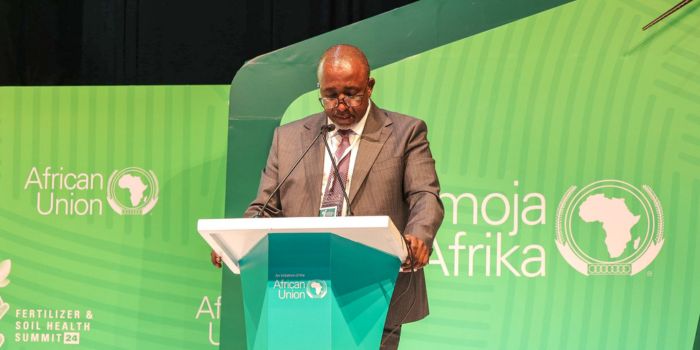Fake fertiliser scandal: The big division that let CS Linturi off the hook

A primary observation by the committee that investigated CS Linturi was that he had no power or authority over the production and distribution of fertiliser in Kenya.
The reason why the impeachment motion against Agriculture and Livestock Development Cabinet Secretary Mithika Linturi failed has come to light.
The report by the 11–member committee that was divided on whether or not to send the CS packing over the fake fertiliser scandal indicates that he had no power or authority over the production and distribution of the commodity in Kenya.
More To Read
- Senators warn Sh10 billion debt threatens NCPB operations ahead of harvest
- Gachagua unveils Democracy for Citizens Party, names Cleophas Malala as interim deputy leader
- Linturi quits UDA, says he won’t be part of a party that embraces corruption, murder
- Gachagua defends Linturi, accuses Ruto of orchestrating fertiliser scandal from State House
- Senate to hear impeachment charges against Meru Governor Mwangaza on Wednesday
- Relief for Agriculture CS Linturi as impeachment bid flops
"In any event, Section 2B(f) of the Fertilisers and Animal Foodstuffs Act states that it is a function of the board to licence manufacturers, distributors, and retailers of fertiliser. This is therefore not a mandate of the CS," it says.
The report was tabled by Marsabit Woman Representative Naomi Waqo, who chaired the select committee.
Further, Waqo that at the time of summoning KEL Chemicals Limited Director Devesh Patel to appear before the committee as a witness, Linturi had been apprehended and charged in a court of law, for, among other charges, fraud in relation to the fake fertiliser scandal.
The report also poked holes in the evidence adduced by Bumula MP Jack Wanami Wamboka, the sponsor of the impeachment motion, as bordering on hearsay and unsubstantiated claims.
For instance, the report mentioned printed impressions of screenshots of calls by Linturi, one Joe Kimote, and John Matiri, the general manager of the National Cereals and Produce Board (NCPB).
Linturi, in his do-or-die defence against several crimes, said the printed impressions attached to a letter by lawyer Ahmednasir Abdullahi had not been authenticated by the police, mobile telecommunication service companies, or any other credible source or authority.
There was also contention among the committee members over the inadmissibility of the contents of a letter by Ahmednasir.
"In response to the allegations, the Cabinet Secretary, in his replying affidavit sworn on May 6, 2024, stated that the letter by Ahmednasir is inadmissible hearsay to the extent that [he] did not receive or otherwise participate in any of the alleged telephone calls or witness the alleged factory visit," the report states.
The committee further observed that Wamboka relied heavily on the letter by Ahmednasir, yet the outspoken senior counsel was not one of his witnesses.
The report further claimed there was no nexus between the Cabinet Secretary and the alleged gross misconduct.
"The allegations as framed do not state with a degree of precision the Article(s) or even Sub-Articles(s) of the Constitution or the provisions of any other written law that have been alleged to be grossly violated," the report indicated.
Dissenting lawmakers
However, the decision by four members of the committee to dissent cast doubt on the reasons why their counterparts cleared Linturi of any wrongdoing.
Other Topics To Read
Those who expressed dissenting opinions were Robert Mbui, Tom Kajwang, Catherine Omanyo, and Yusuf Mohamed, who said their decisions were based on constitutional principles and were largely informed by their understanding and appreciation of the role and mandate of the committee.
"The minority averred that the majority are treating this committee as a strictly adversarial judicial body. The minority dissents that the committee is sitting like judges in a court of law," notes the report.
The four lawmakers added that the oversight role exists even in the absence of a motion by a member of Parliament or a petition from the public. According to them, the National Assembly cannot abdicate its oversight role by citing technicalities, even where the National Assembly can go out of its way to establish the position.
"The minority observed that it will be a dereliction of duty for the committee to fail to get to the bottom of an issue and cite adversarial technicalities as justification," notes the report.
Further, the four said the cited issues and others do not require evidence and that the majority's insistence on a lack of an expert to test if the fertiliser is fake or substandard was unnecessary.
The dissenting lawmakers also accused Linturi of deliberately failing in his responsibility to give accurate information to Kenyans once the fake fertiliser scandal was unearthed.
Instead, they said, as evidenced by audio-visual clips played before the committee and the record of the Departmental Committee on Agriculture and Livestock, the CS blatantly went before the media on various occasions, giving conflicting accounts and misleading the public further.
"Accordingly, it is not disputed that the Cabinet Secretary told the Committee on Agriculture and Livestock Development that what was distributed was not meant to be a chemical fertiliser but a soil conditioner. It is part of the record of this House," avers the dissenting minority.
Following these proceedings, the Agriculture minister is officially cleared of any wrongdoing in the scandal.
Top Stories Today












































